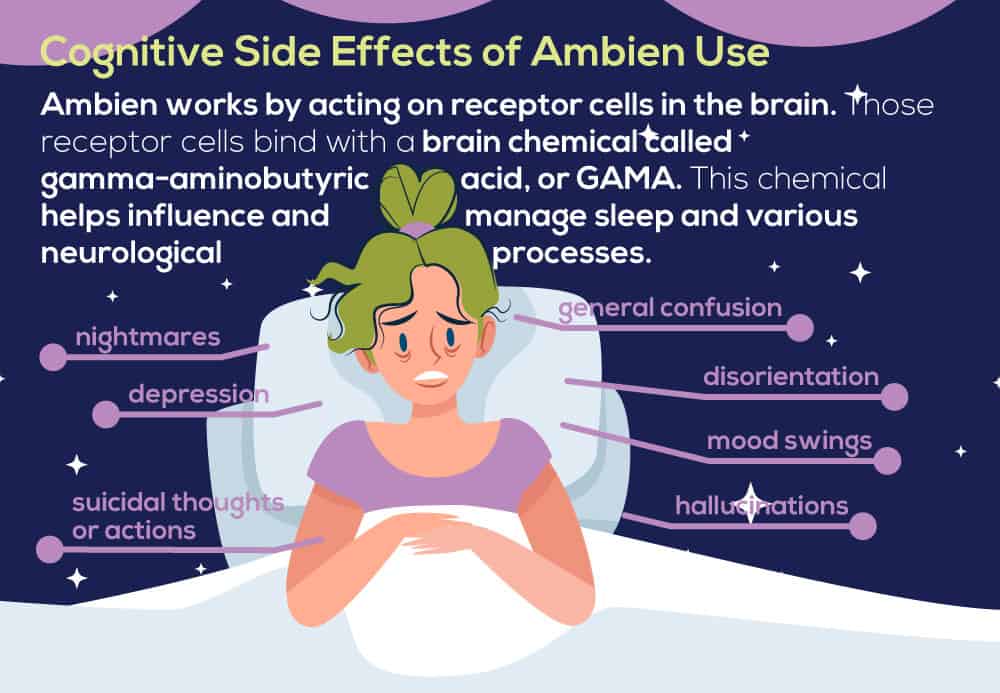Ambien is widely popular for helping insomniacs sleep peacefully. However, Ambien addiction side effects cannot be overlooked. Ambien is notoriously popular for its dependency and addictions. It is no secret that individuals can develop a tolerance to Ambien even after they take it on the advice of a certified medical professional.
About 4% of the adult population of the United States use prescription drugs like Ambien to aid their sleep. There is no doubt that Ambien aids insomniacs in helping and staying asleep. However, there are too many Ambien side effects that sometimes outweigh the benefits of this drug. A person may suffer from cognitive impairment if this drug is used or misused for a long period.
As per studies, 15% of the adult population of the United States are suffering from mental health disorders that affect sleep or insomnia. Out of these statistics, women are facing illnesses that affect their sleep more than men. The chances of women suffering from insomnia are higher compared to men. According to statistics released by the Government of the United States, 1 out of 4 women suffer from insomnia.
In this blog, we will discuss Ambien addiction side effects and what to expect during the withdrawal timeline.

What is Ambien (Zolpidem) and what is it used for?
The drug Zolpidem is manufactured and retailed under the trade name of Ambien. The makers of this drug marketed Ambien as a medicine that can help insomniacs sleep peacefully. Due to the Ambien addiction side effects, certified medical professional are particular about prescribing Ambien as a temporary and short-term treatment for insomnia.
However, once people are exposed to the effects of Ambien in their sleep, they feel the urge to misuse this drug. Some people exceed their recommended dosage while some misuse this drug by procuring it without a prescription and taking it to aid their sleep. Additionally, some people may even start mixing this drug with other intoxicants such as alcohol and cannabis.
Being a sedative and a hypnotic, Ambien helps insomniacs sleep by depressing the central nervous system. The sedative effect of Ambien is produced when this drug slows brain activity to aid sleep.
Due to the prevalence of Ambien addiction side effects, the FDA has classified this drug as a controlled substance. The intention of the authorities behind declaring this drug as a controlled substance is to stop people from using this drug recreationally.
Is Ambien addictive?
When Ambien was introduced, it gained rapid popularity for being perceived as a safer and more effective alternative to benzodiazepines like Xanax and Valium, which are known to heavily impact the central nervous system.
Initially marketed as less addictive, Ambien was believed to offer a better option for sleep aid. However, it was later discovered that Ambien, despite its initial claims, could indeed lead to addiction with severe and potentially fatal consequences.
Ambien functions as a central nervous system depressant, altering dopamine levels in the brain, which can induce hallucinatory and euphoric effects. This can create a cycle of dependence, where individuals continue using Ambien beyond prescribed limits, leading to tolerance and the need for higher doses to achieve the desired effects.
Ultimately, this cycle of dependence and tolerance can result in a downward spiral, requiring medical intervention to address the addiction.
What are the Ambien addiction side effects?
There is no doubt that Ambien helps manage the symptoms of insomnia. This drug is prescribed by the doctors to help the patients fall and stay asleep efficiently. However, if an individual is taking this drug without a prescription or exceeding the recommended dosage of this drug, they might suffer from the following Ambien addiction side effects:
- Nausea
- Vomiting
- Tiredness or fatigue
- Poor motor ability skills
- Memory loss of events when the drug was in the system
- Sleepwalking
- Inability to function or feel energetic the following day
- In severe cases, an individual may also feel hallucinatory effects when this drug is being used for a long period
Due to these dangerous side effects, the FDA has declared Ambien to be a controlled substance. This means that one cannot procure Ambien without a prescription from a certified medical professional. Despite this, some people procure Ambien illegally for recreational purposes.
If an individual is taking Ambien for a long period, they might develop a tolerance to this drug. Ambien abuse and side effects also lead to an individual depending on this drug for something as simple as sleeping.
Ambien addiction side effects are worse when Ambien is taken recreationally. Unfortunately, people find it acceptable to mix this highly sedative and hypnotic drug with other intoxicants like alcohol and cannabis. Some individuals may find it harmless if Ambien is taken once or twice. However, this so-called harmless use leads to substance abuse disorder. This can be a result of the following factors:
- Arbitrarily extending the use of Ambien for a longer period than what was originally advised by the doctor
- Feeling the craving for this drug
- Increasing the dosage of this drug on their own
Once an individual becomes addicted to Ambien, the risk of overdose becomes a significant concern, especially when the drug is used recreationally. Misuse often leads to a tolerance buildup, prompting users to ingest higher doses to achieve desired euphoric and hallucinogenic effects.
However, overdosing on Ambien isn’t solely a consequence of misuse. Given its classification as a central nervous system depressant, Ambien users commonly experience forgetfulness, impaired memory, and cognitive decline. In such instances, individuals may inadvertently take multiple doses, increasing the risk of overdose.
Symptoms of Ambien overdose typically include extreme drowsiness, rapid heart rate decline, and respiratory difficulties. Left untreated, overdose can lead to paralysis, coma, or even death. Further details on Ambien overdose will be explored in the following section of this blog.
How to spot Ambien addiction side effects in the early stages?
It is a sad reality that a lot of people are under immense stress in their daily lives due to their interpersonal relationships, their jobs, studies, and personal and career goals. This leads to the development of disorders that affect sleep in individuals.
Doctors prescribe Ambien as a short-term treatment for sleep-related disorders like insomnia. However, many individuals start seeing this drug as recreational or as an assistance to aid their non-existent or irregular sleeping pattern.
Just like any other drug, it is dangerous to take Ambien without consulting a certified medical professional. It is not recommended to take this drug for a long period even with a prescription. Prolonged use of Ambien leads to tolerance of this drug. Due to Ambien tolerance, doctors have to administer higher doses of this drug even when they do not recommend doing so.
During the early stages, Ambien addiction side effects are not that pronounced. In such circumstances, it is important to be aware. Initial symptoms of Ambien addiction side effects are as follows:
- Feeling weak or lethargic
- Poor coordination skills
- Feeling of drowsiness
- Memory loss when Ambien was in the system
- Slower heart rate and breathing
- Muscle spasms
- Some severe side effects include hallucinations
In some cases, individuals may unknowingly overdose on Ambien which can be fatal. It does not help that there is a lot of ambiguity revolving around what is considered misuse of this drug. In simple terms, if an individual takes even 1 extra dose of Ambien to help them sleep, it is considered a misuse of this drug. A single misuse can lead to a downward spiral of Ambien tolerance, addiction, and Ambien addiction side effects.
A family member, a loved one, or a friend must be extra cautious around the patient when they are taking Ambien. Since this drug gives patients relief from the perpetual illness of insomnia, they might convince themselves and those around them that this drug is all they need to get their lives on track. They might justify Ambien’s abuse by arguing that they are not able to sleep or function normally without taking this drug.
During the early stages, it is easier for an individual to feel the urge to have one extra dose of Ambien out of their own accord which might lead to tolerance. Once an individual develops Ambien tolerance, they might get addicted to Ambien. This makes the individual vulnerable to an overdose that can be fatal.
Ambien Addiction Side Effects and Ambien Overdose
It is unfortunate that when people think of a drug overdose, they associate it with other hard drugs like cocaine, LSD, ecstasy, MDMA, etc. However, the truth is that just because Ambien is prescribed by certified medical professionals, it does not mean that one cannot overdose on Ambien.
An individual can face Ambien addiction side effects even when they are strictly taking this drug on the prescription and recommendation of their doctor. This is the reason doctors prescribe this medicine for short periods of 7 to 10 days. If this drug is strictly taken as per the duration prescribed by a doctor, it would not pose any risk to their lives.
However, if this drug is misused, or taken for a longer period, it may react negatively with the central nervous system. While overdosing, individuals may feel the following symptoms:
- Difficulty in breathing
- Restlessness
- Slower heart rate
- Confusion due to slower brain activity
To avoid an overdose, it is crucial to stick to the recommended dosage of Ambien.
FAQs
What are the long-term Ambien addiction side effects?
There are several Ambien addiction side effects. People who use Ambien for a long period may lose consciousness at any time of the day, face memory loss or amnesia, or even lose their coordination skills. This is because Ambien is a central nervous depressant and slows brain activity to help people with insomnia fall and stay asleep.
Can Ambien’s addiction side effects cause permanent damage?
The short answer to this question is, yes. Ambien addiction side effects can cause permanent damage to the brain and other major organs like the liver and the kidneys. This is because Ambien manipulates the dopamine levels in the brain. This hampers the natural production of dopamine in the brain. Being a central nervous depressant, prolonged use of Ambien may result in amnesia and hallucinations as well.
How to manage Ambien addiction side effects?
If an individual strictly adheres to the advice of their medical professional, they will be able to manage the mild side effects of Ambien.
Is Ambien habit-forming?
Yes, Ambien is habit-forming, and exceeding the recommended dosage of Ambien may result in Ambien tolerance and dependency. Ambien dependence means that the individual will find it next to impossible to sleep without taking this drug.
Can Ambien cause neurological problems in an individual?
Since Ambien depresses the central nervous system, it can cause neurological problems like amnesia and dementia if used for a long period of time. Ambien can even cause psychotic reactions in patients.
Conclusion
In some circumstances, it might be impossible for individuals to stay away from Ambien as it is a medication that helps in treating the symptoms of insomnia. Therefore, it is crucial to understand the Ambien addiction side effects to be cautious while taking this medicine.
By now, we are confident that you are well aware of the dangers and side effects of Ambien addiction. If not used properly, this drug can take a toll on the physical and mental well-being of an individual. Once an individual becomes dependent on this drug, they might suffer from cognitive impairments, mood swings, addiction, and deteriorating mental health.
Therefore, it is crucial to stick to the prescribed dosage and frequency of Ambien if it is necessary to resort to this drug to deal with the symptoms of insomnia.
Along with Ambien, our experts at Avisa Recovery treat mental health and drug use disorders with utmost care and efficacy, taking into account their delicate and complex nature. Our goal is to support people in achieving a long-term recovery and better quality of life. Our program is an evolving, linked community of clinical and medical experts that incorporates the most recent findings and evidence-based practices. Participants in our program are given individualized treatment plans that incorporate various therapeutic modalities. Our comprehensive treatment approach takes into account the emotional, mental, physical, and spiritual needs of the patient to heal them as a whole.










